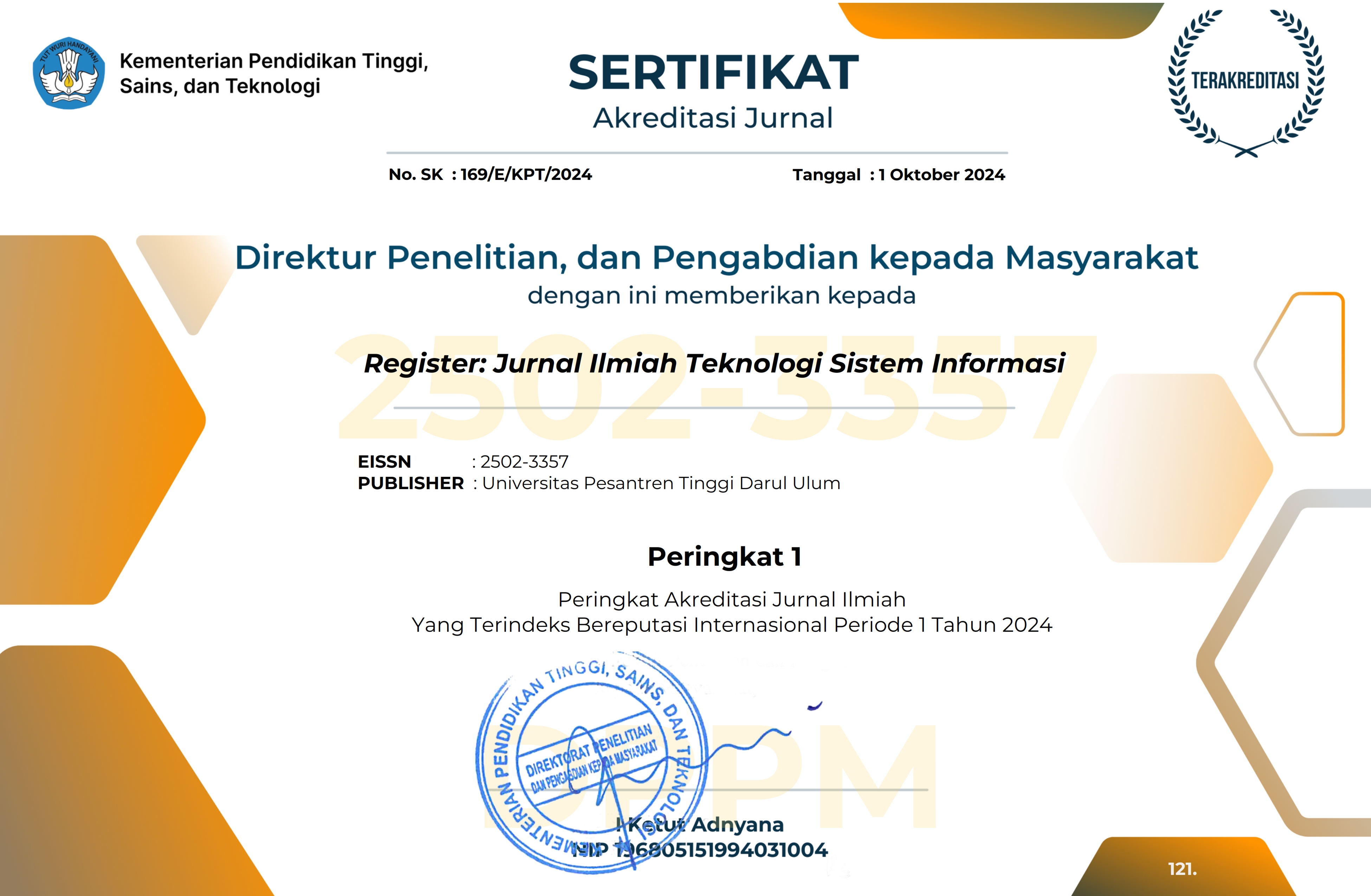Permasalahan Implementasi Sistem Informasi Di Perguruan Tinggi Swasta
https://doi.org/10.26594/register.v2i1.441
Abstract
Efektivitas implementasi sistem informasi dalam proses manajemen kelembagaan sering terhambat oleh banyak faktor. Sehingga mengakibatkan transformasi business process yang diharapkan dengan sistem informasi berakselerasi dengan cepat justru mengalami kemandekan. Pada penelitian ini mengkaji permasalahan dalam impelementasi sistem informasi di perguruan tinggi swasta. Dari hasil penelitian ini menunjukkan bahwa terdapat masalah yang sifatnya teknis dan non-teknis. Masalah teknis, diantaranya adalah internet, infrastruktur jaringan, perangkat komputer dan pendukungnya, keamanan sistem, integrasi sistem, ketersediaan sistem, dan pemeliharaan Teknologi Informasi (TI). Sedangkan masalah non-teknis dalam implementasi sistem informasi di perguruan tinggi swasta, yaitu penerimaan dan partisipasi, budaya dan perilaku, sumber daya manusia, perencanaan, manajemen dan tatakelola TI, organisasi, konten sistem informasi, anggaran dan biaya, serta dukungan pimpinan dan karakter kepemimpinan. Kata kunci: sistem informasi, masalah teknis, masalah non-teknis. Abstract The effectiveness of the implementation of information systems in the process of institutional management is often hampered by many factors. Resulting in business process transformation that is expected to accelerate quickly information systems precisely to stagnate. In this research study the problems in the implementation of information systems in private colleges. From the results of this study indicate that there are problems that are both technical and non-technical. Technical problems, which are internet, network infrastructure, computers and supporters, security systems, system integration, system availability, and Information Technology (IT) maintenance. While the non-technical issues in the implementation of information systems in private colleges, namely acceptance and participation, culture and behavior, human resources, planning, management and governance of IT, organizations content of information systems, budget and cost, support leadership and character of leadership. Key word: information systems, technical issues, non-technical issues.Downloads
References
Budiyanto. (2009). Tesis: Evaluasi Kesuksesan Sistem Informasi Dengan Pendekatan Model Delone Dan Mclean (Studi Kasus Implementasi Billing SystemDi RSUD Kabupaten Sragen). Surakarta: Magister Akutansi FE Universitas Sebelas Maret. Curry, J. R. (2002). The Organizational Challege: IT and Revolution in Higher . Educause Review, Maret-April, 40-48. Hidayat, M. R. (2009). Pencarian Dan Pemaknaan Metodologi. Jakarta: FIB UI. Janson, M. A., dan Subramanian, A. (1996). Packaged software: Selection and Implementation Policies. INFOR 34(2), 133-151. Mustakini, J.H. (2007). Sistem Informasi Keperilakuan. Yogyakarta: Andi. O’Brien, J. A. (2006). Pengantar Sistem Informasi Perspektif Bisnis dan Manajerial Edisi 12. Jakarta: Salemba. Wahid, F. (2004). Peluang Dan Tantangan Pemanfaatan Teknologi Informasi Di Perguruan Tinggi. Media Informatika, 2, 11-22. Winarno, W. W. (2007). Sistem Informasi Manajemen. Yogyakarta: STIE YKPN.
Downloads
Published
How to Cite
Issue
Section
License
Please find the rights and licenses in Register: Jurnal Ilmiah Teknologi Sistem Informasi. By submitting the article/manuscript of the article, the author(s) agree with this policy. No specific document sign-off is required.
1. License
The non-commercial use of the article will be governed by the Creative Commons Attribution license as currently displayed on Creative Commons Attribution-NonCommercial-ShareAlike 4.0 International License.
2. Author(s)' Warranties
The author warrants that the article is original, written by stated author(s), has not been published before, contains no unlawful statements, does not infringe the rights of others, is subject to copyright that is vested exclusively in the author and free of any third party rights, and that any necessary written permissions to quote from other sources have been obtained by the author(s).
3. User/Public Rights
Register's spirit is to disseminate articles published are as free as possible. Under the Creative Commons license, Register permits users to copy, distribute, display, and perform the work for non-commercial purposes only. Users will also need to attribute authors and Register on distributing works in the journal and other media of publications. Unless otherwise stated, the authors are public entities as soon as their articles got published.
4. Rights of Authors
Authors retain all their rights to the published works, such as (but not limited to) the following rights;
Copyright and other proprietary rights relating to the article, such as patent rights,
The right to use the substance of the article in own future works, including lectures and books,
The right to reproduce the article for own purposes,
The right to self-archive the article (please read out deposit policy),
The right to enter into separate, additional contractual arrangements for the non-exclusive distribution of the article's published version (e.g., post it to an institutional repository or publish it in a book), with an acknowledgment of its initial publication in this journal (Register: Jurnal Ilmiah Teknologi Sistem Informasi).
5. Co-Authorship
If the article was jointly prepared by more than one author, any authors submitting the manuscript warrants that he/she has been authorized by all co-authors to be agreed on this copyright and license notice (agreement) on their behalf, and agrees to inform his/her co-authors of the terms of this policy. Register will not be held liable for anything that may arise due to the author(s) internal dispute. Register will only communicate with the corresponding author.
6. Royalties
Being an open accessed journal and disseminating articles for free under the Creative Commons license term mentioned, author(s) aware that Register entitles the author(s) to no royalties or other fees.
7. Miscellaneous
Register will publish the article (or have it published) in the journal if the article’s editorial process is successfully completed. Register's editors may modify the article to a style of punctuation, spelling, capitalization, referencing and usage that deems appropriate. The author acknowledges that the article may be published so that it will be publicly accessible and such access will be free of charge for the readers as mentioned in point 3.



















